Saint Joan - Interview
by Dominic B. Simpson
published: 15 / 4 / 2005
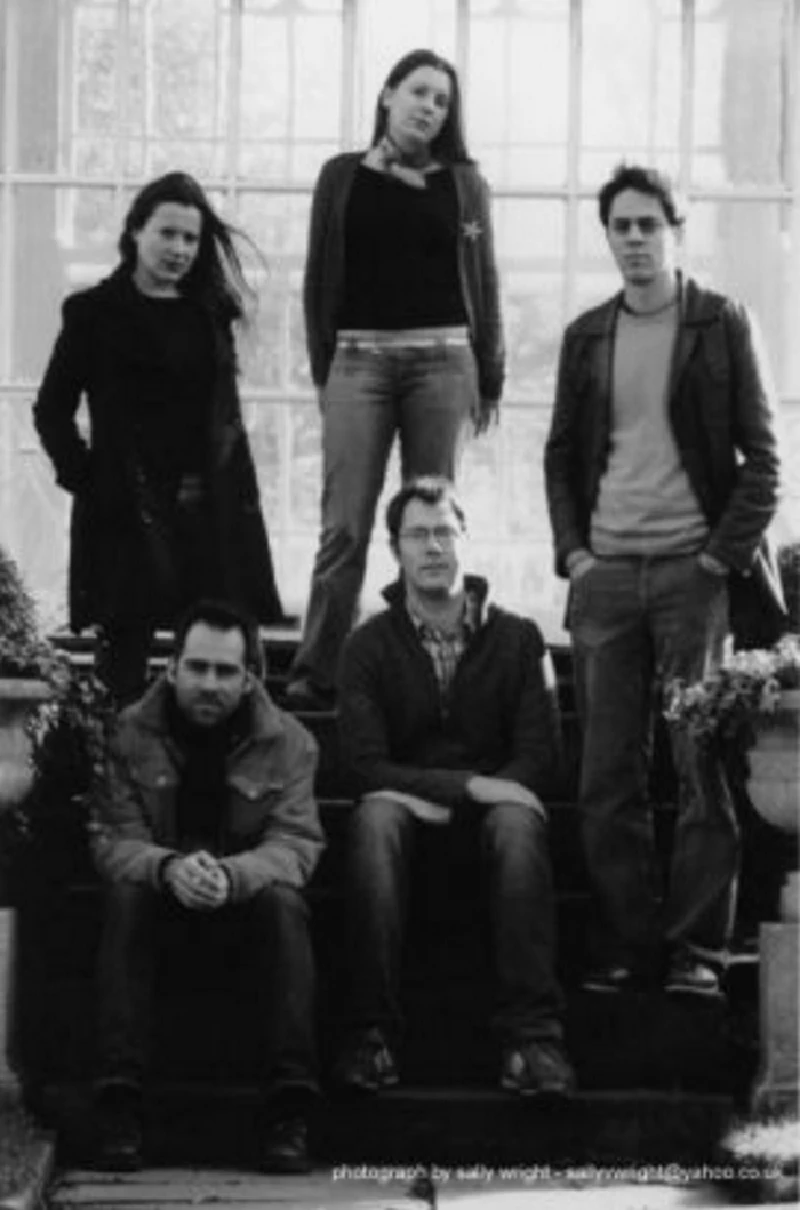
intro
Literary Nottingham post rockers and Pennyblackmusic Bands Night stars Saint Joan have recently self-released their debut mini album, 'One at Twilight', on their own Dakota label. They speak to Dominic Simpson about it and changing direction
Nottingham’s Saint Joan craft intense, delicate music which, while often sad and desolate, can be intensely profound and beautiful. Frequently suffering from insomnia, they’ve reminded my fatigued mind of late night walks round the centre of London, taking in the dizzying sights and unusual shapes of buildings, a reflective set of songs that soundtrack the drama and frustration of everyday life. Emerging sometime in 2001 or so, they released the stunning 7” ‘The Ice House’ / ‘All Things Melt’ – two tracks, each clocking in over the seven minute mark, of windswept beauty. The first time I saw them, at a Pennyblackmusic night at the Spitz around two years ago, they ripped into ‘The Ice House’ at the end of their set with an intensity that left the crowd stunned, and as the band exited the stage there were repeated calls for an encore. Though their music is often lyrically dense and melancholy, it remains ultimately uplifting, if not always easy listening, and brings to mind the likes of Galaxie 500, Yo La Tengo, Damon and Naomi and even the Tindersticks in its stately, violin-augmented beauty. “Inside they’re having a party / I can see them dancing the night away”, Ellen sings on ‘Klaus Kinski’, and you know straight away that her persona in the song is not part of the festivities, but rather an isolated outsider. Since then the five-piece have worked on a mini-album, 'One At Twilight', a collection of intimate songs finally released a couple of months ago in which the band have slightly redefined their sound. The occasion for this interview is due to a set they are playing downstairs at the King’s Head in Crouch End, billed as "a local night for local people." We retire to a quieter nearby pub after their soundcheck, near the towering clock at the centre of Crouch End. Later on that evening they will play an intense, dark set in support of Last Harbour, who they're touring round the UK with, while a couple of weeks from now they will go onto support Quasi (on Domino Records) at the London Garage. I’m nervous. I wonder with music like this if the members of Saint Joan can be daunting to interview, but mostly they are friendly and helpful, despite having had to drive down to London from Nottingham. Bassist Christophe, originally from France, is quiet but convivial for most of the interview, while violinist Krisa, (Krisztina) smiling in the seat next to me, is originally from Hungary but lived in France for a while before moving to Nottingham. While Krisa and drummer Matt Harris occasionally interject, singer/guitarist Ellen and lead guitarist Matt Williams do most of the talking. “I’d been playing guitar and singing and stuff since I was 17 or 18 and then I got various bands together, but this band – we’ve only been together two and a half years”, says Ellen. “It was Ellen, Christophe and me, and then Matt W and Kris joined”, Matt H adds. Confusingly, considering there’s already two Matt’s in the band, they had a third who played on ‘The Ice House’ record… “Yeah, Matt Harrison”, recalls Ellen. “We had a guy who played flute in the band for a while, but then he left and Matt W joined”. Harrison contributed to the afore-mentioned ‘Ice House’ a while back, layering a haunting flute line that became more and more dizzying as the song reached it’s swirling, intense conclusion. On 'One At Twilight' the sound has shifted, so that while the 7” seemed a much more kind of looser, "spacier" sort of sound, splintering off in all directions with its heavily delayed wall of guitar, the new mini-album is more grounded, with less effects and a cleaner sound tailored more to the singer. As Matt W agrees, “We are a bit like a backing band in many ways for Ellen’s voice. We are a band as in a collective band but basically what we do as a band – violin, drums, bass, guitar – we weave around whatever it is that Ellen’s doing… we deliberately try and create as much space as possible now.” Is that new coherency in their sound because of Harrison leaving, I wonder? “I don’t know if the change in sound is anything to do with him leaving”, Ellen counters. “I mean, obviously it’s quite a distinctive sound and he did play a lot of the set, so it impacted a little bit…” “It’s definitely changed, though”, Matt W opines. “I think that’s the key – it’s how songs are written”, Matt H says. “The one’s that sound a bit ‘post-rockey’ like 'The Ice House' and 'All Things Melt' started up from jamming…whereas now things are a lot more structured.” “I came in and replaced Matt Harrison, who played the flute, and I basically came in on guitar whereas he played the flute, and I’d just learnt to play the guitar - I’ve not used many effects”, Matt W reveals. The change in sound accordingly “wasn’t conscious”, he opines. “I could try and do what Matt [Harrison] did on the flute with guitar but…” EM: “We kind of wanted to take it in a different direction. I think sometimes we felt that the flute kind of swamped….” MW: “It was overcomplicating some of the songs.” EM: “Yeah, it was overcomplicating simple songs sometimes, and we wanted to take them back to kind of the basic songs…. I either write them and then bring them to the band or maybe Matt and me will write them together. So yeah, some of the songs are…we basically have three ways of writing songs, which is that either Ellen’s already written one on her own, or Christoph – like in 'December' or in 'All Things Melt' – will start jamming a bass line and the band will carry on over the top; and the third is that I’ll come up with a song structure and I won’t know what to do with it, and the rest of the band will come in.” K: “We seem to be more reflecting on the songs more than before, kind of discussing what to do with them.” Perhaps it’s that 'One At Twilight' is more of a group effort, for want of a better word, than the previous 7”. It’s sounds like a natural evolution in any case. The mini-album certainly isn’t as effects-laden or as expansive as on ‘The Ice House’, and in general there’s less ornamentation – though Krisa’s haunting violin sound has remained. There’s also an inventive beginning to the album, with a metronomic tick-tock, rather like a heartbeat, ticking away as the first track slowly gets underway (Matt H admits that it’s simply a computer playing 4/4 to keep time rather than a real metronome). “You know when you’re lying in bed with insomnia and you have that ticking noise? It’s that kind of sound….or like your heart beat”, Matt W smiles. “And we thought it went quite well as an opener.” It reminds this writer of the sound that plagued me when I suffered from a particularly bad ear infection that lasted for most of January, though Matt W diverges on this point: “It doesn’t remind me of that”. When considering the album in general he posits: “It’s literally the five of us, and it was like our first recording together – well, for me it was, apart from the Slow Noir compilation that we did. I think it was almost like us learning the recording process. It’s like, you can hear that a bit, but that’s not to say that it’s bad for it. It’s kind of considered, is how you’d describe it really.” Interjects Matt H, “I mean, we were lucky with the recording process because we had the advantage of the studio and we were able to take our time about it rather than having to be watched for deadlines and having to pay for studio time. We were able to use our studio and go whenever we wanted…it was good to have friends to help us out.” “And they really like our music and understand where we’re coming from in terms of like ‘less is more’”, adds Ellen. This certainly contrasts with many of the annoying, anonymous sound engineers that lurk in studios, unable to cope with any aesthetic that goes beyond the Tin Pan Alley view of music, cynical and completely unable to feel any thrill from music out there - “they’re just like jobsworths”, agrees Ellen. “It’s like live sound men who are just there to do a job.” “I think the difference lies in the texture” Kirsa adds, returning to the recollection of their own recording process, “like using different instruments - it’s also to do with the length of the songs…we’re deliberately trying to make the songs shorter”. That is, apart from the last track on 'One After Twilight, ‘For Star City’ (which is around seven minutes)…but before this the feel of the mini-album is much more concise than 'The Ice House’ EP, which leant almost towards a post-rock, looser feel, with the two songs stretched out over the eight minute mark. MW: “I think that’s it…I think with things like ‘The Ice House’ and ‘All Things Melt’, you couldn’t have a whole set of songs that are eight minutes long…” EM: “Well, you could, but…” PB : People would get annoyed? MW: “It kind of takes away from….when a song is longer, you want it to stand out – you know, be worthy of it’s length rather than being song for the sake of it.” K: “On a mini-album, you kind of have to because otherwise it’s like listening to two songs.” It’s true, mini-albums by their nature require that the songs cannot be too long or self-indulgent. Matt W agrees that the mini-album is a “dying art” despite the fact that such luminaries as Sonic Youth, Yo La Tengo, and the Pixies all began with them. MW: "We self released this album on because…I think we’ve worked out that the music industry is changing, and the idea of sending out a demo and getting signed is a dying concept. I’m sure it happens to some bands, but you have to know someone in the business or, you know, your demo has to go to the right person or whatever….so we’ve actually just gone all the way and put it out [on their own Dakota label, run from their upstairs room]. Mini albums are a good concept. They’re a bit of a dying art really. We couldn’t really afford to record more than six tracks, so that’s why we did it (laughs). I think it works though. We take our reviews seriously that we get, and with the sort of themes and intensity that’s on there, it would be a kind of almost gruelling listen." MH: “We’re pleased that the six songs are half an hour. I think that’s a good length.” PB : It’s six songs, but only four minutes less than the first Ramones album, which is only 32 minutes long but has 14 tracks. (Laughter all around) EM : “Right.” One of the most interesting tracks on the new albums, 'The Ways That We Shall Go Upon', begins sounding similar to 'Playing With Fire'-era Spacemen 3, with a droning organ riff that fluctuates between two chords and a simple chiming guitar progression, over which Kirsa bows a mournful violin riff that slowly builds with the drums and bass before Ellen intones some particularly profound and emotive lyrics: “I came upon a scene that night / Beneath a twilight serenade / I looked upon a shining light / A dozen ukuleles playing / And so my evening settled down / We waited for the evening sun / The stars strung out in lilac clouds / To leave the ways that we shall go upon”. There’s an almost stream-of-consciousness feel to the song similar to the b-side of 'The Ice House', 'All Things Melt'; on that song Ellen talked rather than sang through a dense monologue in much of the song before finally breaking into verse. Perhaps inevitably the conversation brings up James Joyce, whose stream-of-consciousness style of writing took the novel too it’s most extreme conclusion with the likes of 'Ulysses' and especially 'Finnegan’s Wake'. Ellen goes to say that she admires writers like Milan Kundera (‘The Unbearable Lightness of Being’ among others), Denis Johnson, John Fante, and Michel Houellebecq (pronounced “Wellbeck”), the brilliant but controversial French novelist whose books – 'Platform' and 'Atomised' – have become something of a modern day Brett Easton Ellis for the twentysomething generation. The thought of Saint Joan using some of the lurid imagery from the likes of 'Atomised' or 'Platform' has Ellen giggling (though lines from the latter were used inventively in '9 Songs'). There’s certainly a literary and cinematic feel to much of Saint Joan’s music, though, which might explain why the opening track in 'One At Twilight' is named after Klaus Kinski, the demented German actor so memorable in Werner Herzog’s 'Agguire: Wrath of God'. The film begins memorably, with a group of travellers slowly descending a misty hillside to some extraordinary music by 70’s Krautrock legends Popul Vuh; we soon learn that they are colonists sailing through the South American jungle, slowly losing their senses as they encounter various local tribes and nomadic peoples. “Well, we watch a lot of films”, Ellen smiles. “We like the amounts of tension in them”, says Matt W. “You can see it in 'Agguire…' - it’s fair to say that Klaus Kinski’s character is quite highly strung [he reportedly fired a gun at the extra’s tent in a rage]. I think scenes like that…listening back to the mini-album, it’s quite tense.” PB : Looking at the influences that you have on your website – Bardo Pond, Yo La Tengo – do you see yourself more in an experimental, post-rock vein or more in a kind of singer-songwriter vein? “I don’t know”, says Ellen considering the question. “It’s funny because we had a review in 'The Wire' magazine and they touched on the Bardo Pond comparison, and I’ve never really seen that…I can’t quite see the connection…” Admittedly that was of 'The Ice House' single, but it’s still true of Saint Joan that they avoid the usual clichés of the precious ‘singer-songwriter’ with the acoustic guitar who has to emote at the Kashmir Club and feels the world has to know about shooting stars. The inventive use of violin and space in their song, for want of a better word, transcends that crowd (not to mention better lyrics) and places them more in the realm of a less pastoral Movietone or Mazzy Star. EM: “I mean, we recorded this one song for a compilation on Ptolemaic Terrascope [magazine that covers music of a mostly space-rock / post-rock bent] and that song has been compared with Bardo Pond because it’s very much effects laden – it was called 'December' [which they go on to play tonight]”. The connection is no doubt to do with a guitar band using flutes – which doesn’t apply to Saint Joan anymore anyway…. EM: “Yeah, and it’s probably because we have a female singer – i.e. me….I really love Bardo Pond but I don’t see us as being anything like that. We’re all influenced by different bands.” MW: “I think the post rock thing is a bit of a red herring. None of us aspire to make, you know, angular post rock records [laughs]….” EM: “We don’t really do that….” MH: “We get compared to Low a lot.” MW: “I think there’s elements of Low, and maybe the Cocteau Twins….I dunno what current singer songwriters. PJ Harvey, maybe…” EM: “I’ve been listening to Sufjan Stevens – he’s pretty amazing.” Ellen’s lyrics run the gamut from resigned to reflective, always contemplating life’s endless obstacles. On the noirish 'Nightmare in E Minor', with it’s almost jazzy chords and drum pattern, she intones “those speeding cars that go by, they should just slow down, there’s nothing here”, the sense of disillusionment high, the realisation that everyday life isn’t a Hollywood film. “I think I was just sitting writing that song, singing whatever came into my mind – it’s probably as basic as that”, Ellen shrugs. While my interpretation of the line is that of a person stuck in a small town desperate to get out, Matt W has his own reading of Ellen’s lyrics: “I interpreted it as old woman in a flat and basically feeling discontentment with most things”, he smiles. “That reminds me of 'The Women Destroyed' by Simon De Beauvoir which is just like a monologue about a woman alone in a flat”, Ellen tells him. MW: “And that line, ‘they drop like flies this time of year’ – I think about that as being like what my Gran was talking about: when you get older your friends begin to die.It’s difficult to talk about our music and remain cheerful” (laughs)…. There’s no getting away from the fact that Saint Joan’s music is often evocative of winter and the cold, with the theme of ice recurring not only in the aforementioned song from their 7” but also on ‘Electric Light Shine On’, a track on 'One At Twilight' wherein Ellen evokes the ice melting beneath feet. “Because it’s cold, basically!” she laughs. “It might be because I write most of my songs in the winter – I don’t know if that’s got anything to do with it…people always say it – a lot of our reviews either talk about the time of the day, or the weather...or the word ‘twilight’”, she smiles, remembering what critics have expounded. MW: “One of the other things about it is, when we recorded it, because it was our friends studio, when we recorded the album it was absolutely freezing – you know literally, I mean you can hear it in a way, our hands are like wooden, like planks of wood. The studio – it was impossible to heat it.” MW: “We’re done for” [laughs]! MH: “No more songs to suggest wintry landscapes….” MW: “We could record our next songs in Barbados – steel drums, a calypso feel….” [the band laughs] The ‘wintry’ feel to the bands music may be almost a cliché, but Matt W admits: “We have been accused of being very miserable.” PB : But just because you have a wintry sound, doesn’t mean you have to sound miserable. Saint Joan’s music to me sounds ultimately uplifting and full of hope. EM: “I think you can find hope in most things – even misery…..” MW: “The songs were written of a certain theme; we recorded it in wintertime; there are some themes running through the album which I don’t think were necessarily intentional, but…” PB : What kinds of things? MW: “Winter. Solitude. Night-time. Death. Sleep.” MH: “All the great things in life!” MW: “We had a good review recently that said, ‘Perhaps One at Twilight could use at least one song that doesn't make you feel like you're on vicodin waiting for the world to end’ [laughter all round], or something like that. That was from Splendid magazine.” EM (to Matt W): “And what was that 'Evening Post' review?” MW: “Saint Joan have got a major problem………” So there is a common thread in reviews then. Maybe on their US East coast tour the audience had fresh ears not so disposed to cast them as miserablists. One eccentric in Providence, Rhode Island posted this among other gems about a gig they played there: “I was kinda worried at first, in my very own, personal, ass backwards, paternalistical, superannuated-hippy way, that maybe it was heroin inspired cause the imagery in the song they played in their soundcheck was so vivid but with this languishing entropy that I associate with catastrophic drug abuse” (etc.) EM: “We played Montague, NYC, Philadelphia, Rhode Island….” MW: “And we played on the oldest college radio station in the world- WPRB-FM.” PB : What are you planning on doing next? “We’d like to play festivals obviously, but that’s hard to get into”, Matt W considers. “We haven’t got an agent, basically. We’d like to play America again”, Ellen says. MW: “We would like someone to encourage us to….we would definitely like to record a long player, but we want it to be right and not just rushed straight in where we’re doing the next twelve songs we’ve wrote; we want to actually think about what to do next...” PB : So you think it probably will be a long player, like 50 minutes? MW: “Yeah, I think so. I think we’ve got to weigh up what’s in contention for being on it.” MH: “We’ve still gotta write those songs – I don’t agree all our songs should be on that album, but I can definitely see it…” MW: “The way I see it, if there are four songs that gel really well we’ll put it out as a new single/EP, but if there’s like 50 minutes of material that runs from start to finish as an album that we’re really pleased with, then that will go out.” PB : This makes a change from many bands who pay little attention to the chronological feel of an album and simply dump songs in any order, discarding any feel and flow to an album. EM: “Yeah, we want an album to be linear.” Whatever they do next, it’s sure to be worth listening to. Saint Joan follow their own trajectory that remains completely free of notions of ‘fashion’ or whatever it is that the ''NME or 'ID' or 'Dazed And Confused' have decided to put on their front cover. Later that night in the dark basement venue with a low roof, the audience is held spellbound by their set, their last song climaxing with Matt W finally coaxing some loud guitar out of his pedal as the song gains pace and intensity, spinning out of control. It’s a beautiful sound. We leave rain swept Crouch End, still on a high after the set and with Ellen’s lyrics.
Picture Gallery:-
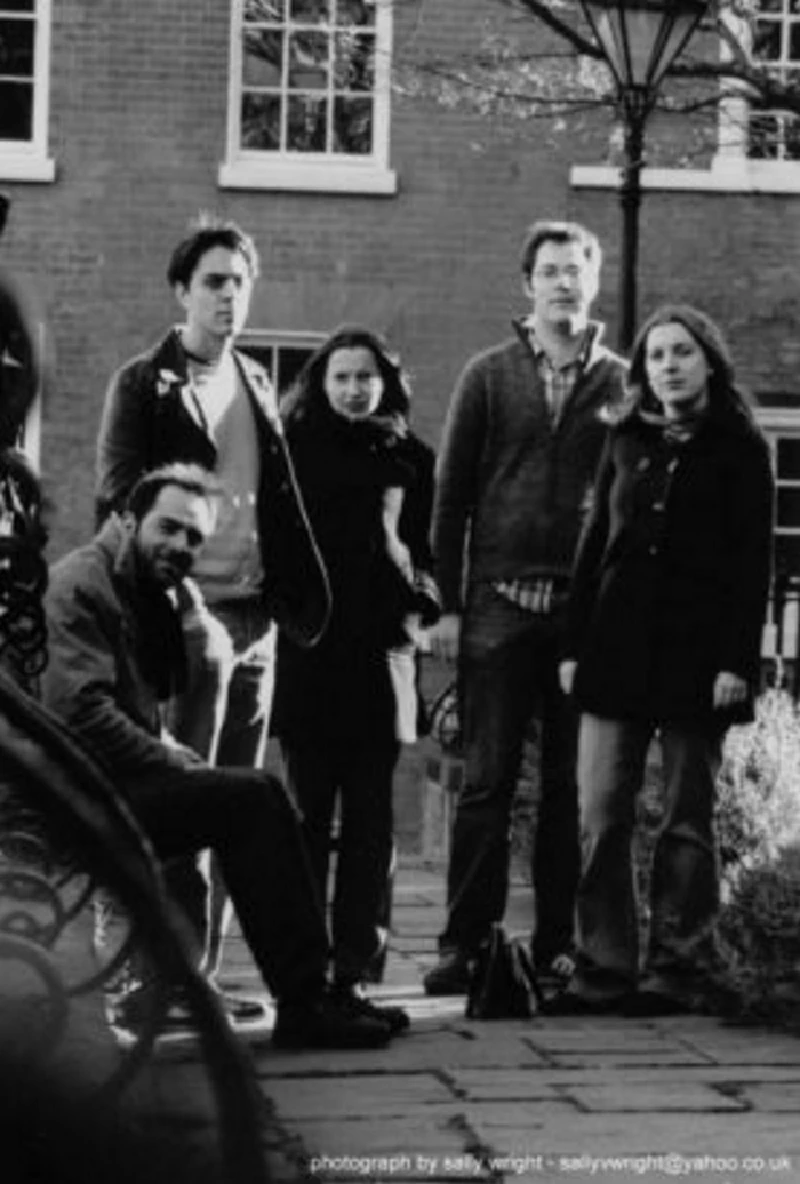
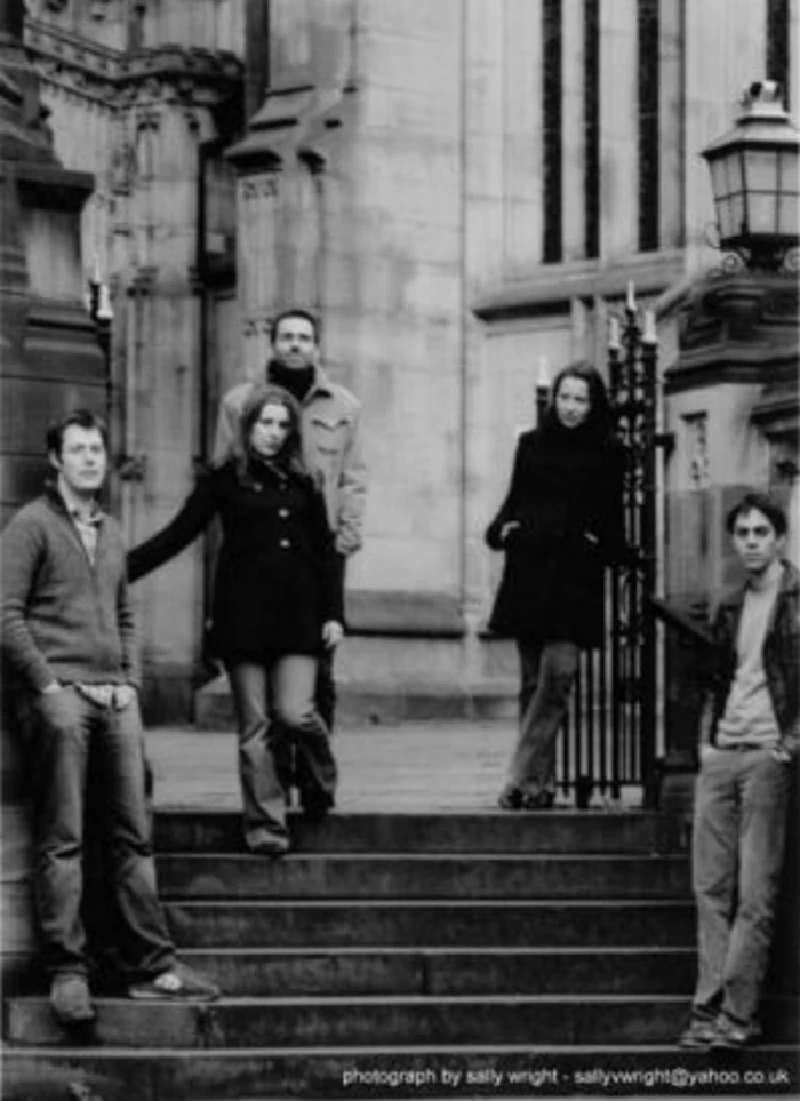
interviews |
|
Interview (2003) |
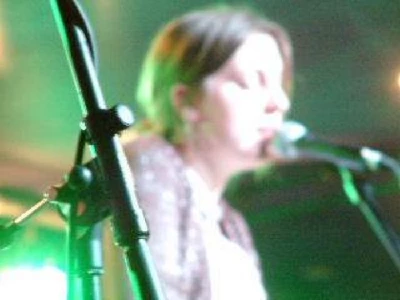
|
| Much acclaimed multinational Nottingham-based five piece Saint Joan combine stream-of-consciousness lyricism with a brooding, dark post-rock sound. John Clarkson talks to them about their forthcoming debut album which is due out later this year |
| Interview (2002) |
reviews |
|
One At Twilight (2005) |
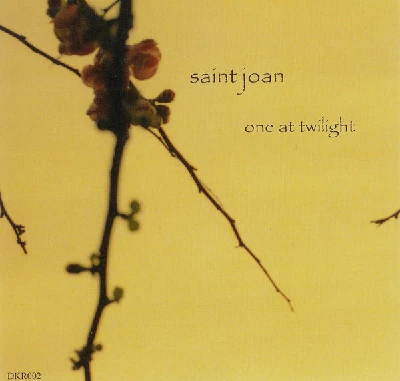
|
| Long-awaited and tantalisingly brief mini-debut album from literary Nottingham rockers Saint Joan, which floats 'on a dreamy plateau somewhere between folk and post rock' |
| Ice House (2002) |
most viewed articles
current edition
Carl Ewens - David Bowie 1964 to 1982 On Track: Every Album, Every SongArmory Show - Interview with Richard Jobson
Colin Blunstone - Thalia Hall, Chicago, 16/7/2025
John McKay - Interview
Visor Fest - Valencia, Spain, 26/9/2025...27/9/2025
Bathers - Photoscapes 1
Billie Eilish - O2 Arena, London, 10/7/2025
Loft - Interview
Robert Forster - Interview
Sir Tim Rice - Interview
previous editions
Heavenly - P.U.N.K. Girl EPManic Street Preachers - (Gig of a Lifetime) Millennium Stadium, Cardiff, December 1999
Beautiful South - Ten Songs That Made Me Love...
Oasis - Oasis, Earl's Court, London, 1995
Prolapse - Interview
Coldplay - Wembley Arena. London, 16/8/2022
Boomtown Rats - Ten Songs That Made Me Love....
Peter Perrett - In Dreams Begin Responsibilities Interview Part One
Trudie Myerscough-Harris - Interview
Pixies - Ten Songs That Made Me Love...
most viewed reviews
current edition
Sick Man of Europe - The Sick Man of EuropeAmy Macdonald - Is This What You've Been Waiting For?
Davey Woodward - Mumbo in the Jumbo
Lucy Spraggan - Other Sides of the Moon
Suzanne Vega - Flying With Angels
Phew, Erika Kobayashi,, Dieter Moebius - Radium Girls
Alice Cooper - The Revenge of Alice Cooper
Bush - I Beat Loneliness
Blueboy - 2
Cynthia Erivo - I Forgive You
Pennyblackmusic Regular Contributors
Adrian Janes
Amanda J. Window
Andrew Twambley
Anthony Dhanendran
Benjamin Howarth
Cila Warncke
Daniel Cressey
Darren Aston
Dastardly
Dave Goodwin
Denzil Watson
Dominic B. Simpson
Eoghan Lyng
Fiona Hutchings
Harry Sherriff
Helen Tipping
Jamie Rowland
John Clarkson
Julie Cruickshank
Kimberly Bright
Lisa Torem
Maarten Schiethart